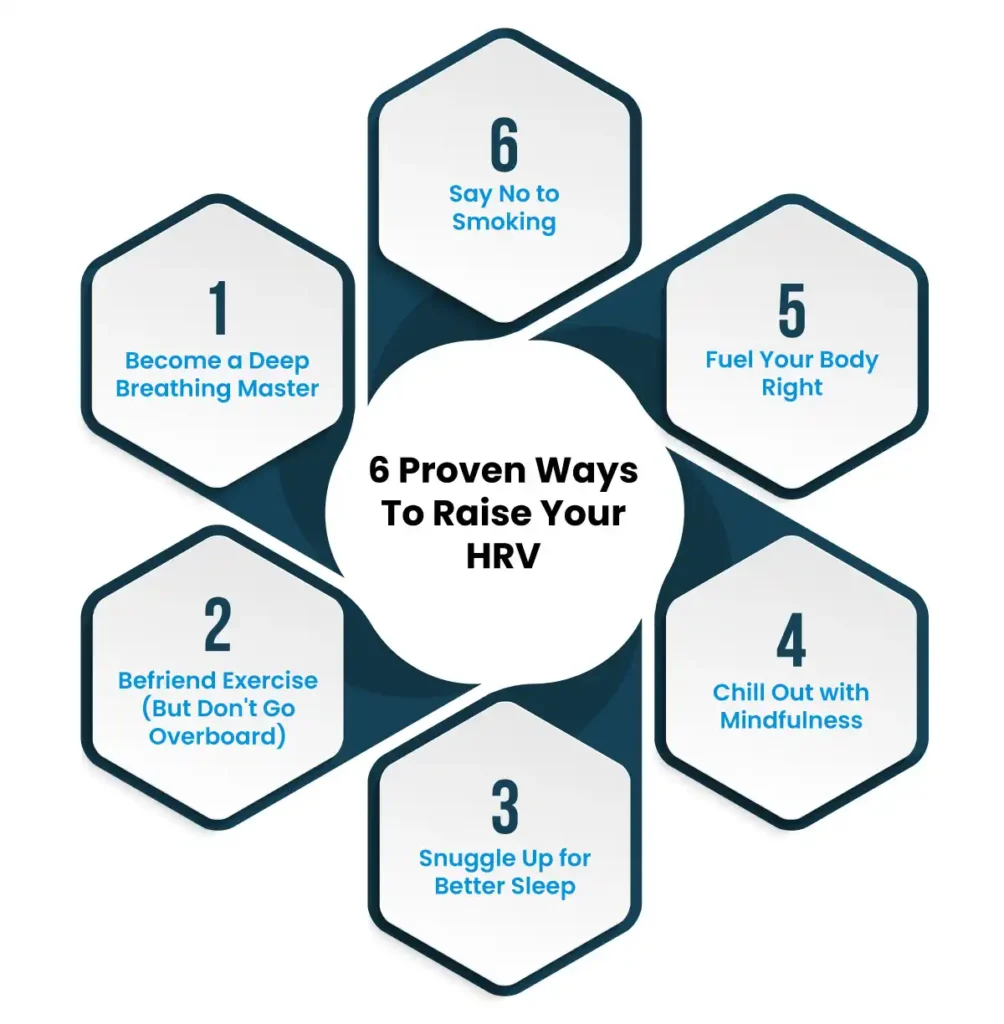

Wearable tech is booming, and with it, our desire to understand our bodies on a deeper level. We track our steps, monitor sleep patterns, and obsess over that ever-important heart rate. But have you heard of HRV or Heart Rate Variability? It might be a new term for some, even though it’s a super important indicator of your heart health.
While most of us are familiar with heart rate itself (beats per minute), HRV focuses on the subtle variations between those beats. It’s like the natural rhythm of your heart, speeding up slightly when you take a deep breath and slowing down when you’re relaxed. This variability might seem insignificant, but it’s actually a powerful indicator of your heart’s health and your body’s ability to adapt to stress.
Buckle up because in this blog post, we’ll explain HRV, why it matters, and, most importantly, how you can easily improve it for a healthier, happier you!
HRV refers to the natural variation in the time interval between your heartbeats. It might sound minuscule, but these tiny fluctuations hold a wealth of information about your heart’s health and your body’s ability to adapt to stress.
Measured in milliseconds (one-thousandth of a second), HRV represents incredibly minute differences. While you can sense a fast or slow pulse rate, these slight variations in HRV require specialized equipment to detect.
Think of your heart rate variability (HRV) as a window into your body’s adaptability and resilience. While a steady heart rate might seem ideal on the surface, a healthy heart rhythm actually exhibits subtle variations. These variations reflect the harmonious interplay between two branches of your autonomic nervous system:
The sympathetic nervous system:
Often referred to as the “fight-or-flight” response, it kicks in during stressful situations, causing your heart rate to increase.
The parasympathetic nervous system:
This branch is responsible for the “rest-and-digest” response, slowing your heart rate and promoting relaxation.
A healthy HRV indicates a well-balanced nervous system, able to respond appropriately to stress and recover efficiently.
Reduced Stress: Higher HRV is often linked to better stress management. A more adaptable heart rate can adjust to stressful situations without going into overdrive.
Improved Heart Health: Studies suggest that low HRV might be associated with an increased risk of heart disease, arrhythmias, and other cardiovascular problems.
Overall Well-being: Research indicates a connection between HRV and improved mental health, sleep quality, and overall well-being.
By understanding your HRV, you can gain valuable insight into your body’s ability to handle stress and maintain a healthy balance.
While the tiny variations in heart rate that define HRV are invisible to the naked eye, there are fortunately a few ways to measure it:
Your HRV isn’t a fixed number, but rather a dynamic dance influenced by various factors. Here’s a breakdown of some key players:
Physiological Factors:
Lifestyle Factors:
Other Influences:
By understanding these factors, you can identify areas where you can make positive changes to optimize your HRV and support your overall health.
We learned that HRV, or heart rate variability, is like a secret weapon for your heart. It shows how well your body adapts to stress and stays in balance. But how do you actually improve this cool feature? Here are 6 easy-to-do strategies to get your HRV grooving:

Remember, even small changes can make a big difference. By incorporating these simple strategies into your daily routine, you can give your HRV a boost and support a healthier, calmer you!
In today’s world, we focus heavily on monitoring various health metrics. While heart rate is important, understanding Heart Rate Variability (HRV) offers a deeper look into your heart’s health and your body’s ability to handle stress.
This blog post unpacked the concept of HRV, explaining how tiny variations in your heartbeat intervals hold significant meaning. We explored how HRV reflects a well-balanced nervous system and is linked to better stress management, improved heart health, and overall well-being.
Talk to an Expert Now